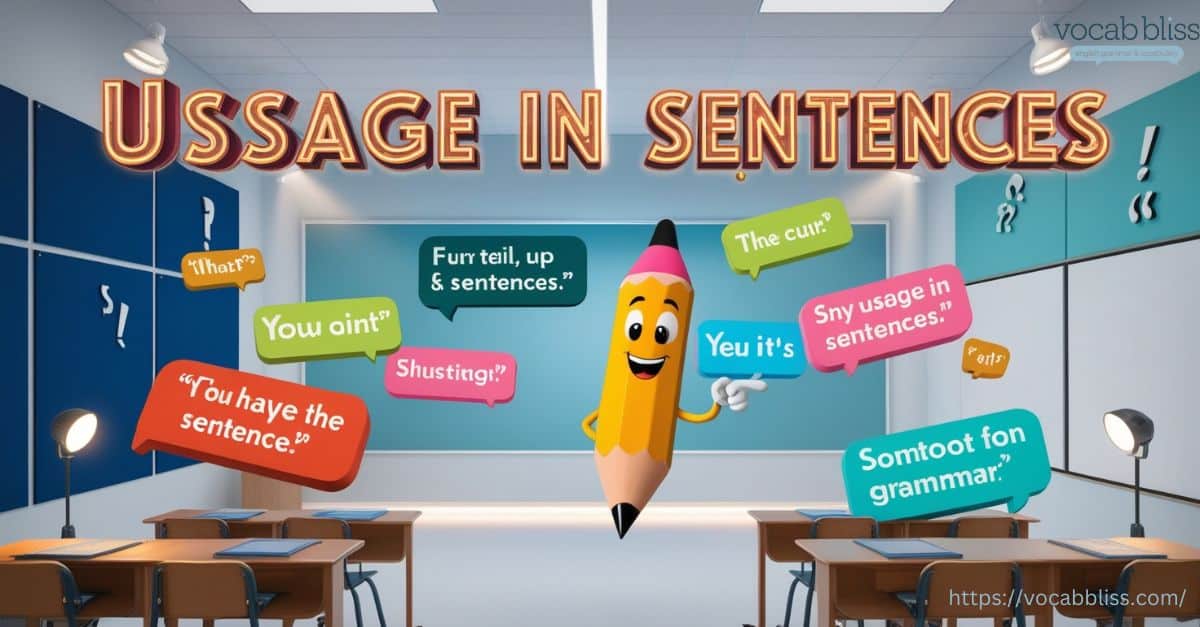Mastering English vocabulary can be challenging, especially when faced with words that look or sound similar but have different meanings. Two such words, allude vs elude, often leave people puzzled. This guide unpacks their meanings, origins, uses, and common mistakes to ensure you never confuse them again.
Quick Summary
In summary, allude vs elude are often confused due to their similar sounds, but they have distinct meanings. Allude refers to making an indirect or subtle reference to something, often hinting at an idea without stating it outright. It’s used when the intention is to suggest or point toward something without fully revealing it. On the other hand, elude means to escape from or avoid something, whether it’s a person, idea, or situation. Elude emphasizes evasion, often requiring skill or cleverness to avoid capture or understanding. To avoid confusion, remember: allude = indirect reference, elude = escape or avoidance. Understanding these differences will help ensure that you use the right word in the right context.
Discover more: Inclosed or Enclosed: The Right Choice for Your Writing
Understanding the Basics
What Does Allude Mean?

Allude means to make an indirect reference to something. Rather than explicitly stating an idea or object, the speaker or writer hints at it, leaving room for interpretation or context.
- Definition and Usage:
- Allude meaning: To refer subtly or indirectly to something.
- Example: “In her speech, she alluded to the hardships she faced without detailing them.”
- It is often used in literature, speeches, and everyday language to engage listeners or readers by requiring them to infer meaning.
- Common Contexts Where “Allude” Appears:
- Literary references: Writers often allude to classic works, historical events, or myths to add depth to their narratives.
- Casual conversation: People might allude to shared memories or mutual acquaintances without explicitly naming them.
- Allude meaning in urdu
The meaning of allude in Urdu is “اشارہ کرنا” (Ishara Karna), which refers to making an indirect or subtle reference to something without explicitly mentioning it.
For example:
- “The painting alludes to themes of freedom and captivity through its imagery.”
- “He alluded to the possibility of a promotion during the meeting.”
What Does Elude Mean?

Elude refers to the act of evading or escaping, often through cleverness or agility. It can describe physical, mental, or metaphorical scenarios.
- Definition and Usage:
- Elude meaning: To escape or avoid something skillfully or to remain out of grasp or understanding.
- Example: “The concept of quantum physics continues to elude me despite multiple explanations.”
- It is frequently used to describe situations where something is just out of reach, whether it’s an idea, a physical capture, or an achievement.
- Typical Scenarios for “Elude”:
- Physical escape: “The thief eluded the police by slipping into the crowd.”
- Mental or intellectual challenges: “The solution to the puzzle eludes even the brightest minds.”
For example:
- “The winning shot eluded the basketball player in the final seconds of the game.”
- “Success eludes those who fail to plan effectively.”
Elude Antonyms
The antonyms of elude include:
- Capture: To seize or take control of something or someone.
- Attract: To draw something or someone towards you.
- Engage: To involve or take part in something actively.
- Confront: To face or deal with something directly.
- Pursue: To follow or chase something or someone.
- Approach: To move closer to something or someone.
These words convey actions that are the opposite of evading, emphasizing capture, involvement, or direct engagement.
Allude vs Elude: Key Differences
Although elude vs allude sound similar, their meanings and nuances are entirely different. Knowing when to use each word is critical for clear and precise communication. Here’s a detailed breakdown:
Breakdown of Meaning and Nuance
- Allude is about referencing something indirectly. It’s subtle and often requires the audience to infer the intended meaning.
- Example: “She alluded to her previous work experience during the interview.”
- Elude focuses on avoidance or escape. It suggests actively evading something, whether it’s physical capture or mental understanding.
- Example: “The fugitive eluded capture for months.”
Key distinction:
- Use allude when hinting or referring to something.
- Use elude when describing an escape or something that is difficult to grasp.
Comparison Table for Quick Reference
| Aspect | Allude | Elude |
|---|---|---|
| Definition | To indirectly reference or hint at something. | To escape, avoid, or remain out of grasp. |
| Nature | Subtle and indirect. | Active and intentional. |
| Example Usage | “He alluded to his favorite movie.” | “The suspect eluded the police.” |
| Context | Often used in literature or speech. | Used in contexts involving evasion or difficulty. |
| Associated Words | Suggest, hint, imply. | Evade, escape, dodge. |
| Memory Tip | Think of “address” for allude. | Think of “escape” for elude. |
Memory Tricks to Avoid Confusion
Keeping elude vs allude straight in your mind can be tricky, but a few simple memory aids can make it easier.
How to Recall the Terms elude vs allude
- Mnemonic Devices and Tips:
- Allude starts with “A” – think of “address” or “allusion,” as it involves addressing or referencing something indirectly.
- Elude starts with “E” – think of “escape,” since elude is about avoiding or evading something.
- Visual and Verbal Associations:
- Imagine a subtle whisper when thinking of allude, as it refers to something quietly or indirectly.
- Picture a person running from a pursuer for elude, emphasizing the act of evasion.
Examples:
- To remember allude, think of a speaker subtly hinting at a point without directly stating it.
- For elude, imagine a slippery fish escaping from a fisherman’s grasp.
What is the Opposite of Allude?
- The opposite of allude would be to state something explicitly or directly.
- Antonyms: Declare, specify, state, articulate.
- Example: Instead of alluding to her plans, she explicitly announced she would move abroad.
- Implications: Using antonyms like “declare” or “state” shifts the tone from subtle to direct, making communication clearer but less nuanced.
Continue reading: Up to Date or Up-to-Date: Which One Fits?
Origins of allude vs elude
Understanding the origins of elude vs allude provides deeper insights into their meanings and usage. Both words have fascinating roots that trace back to Latin.
Etymology of Allude
- Historical Roots and Language of Origin:
The word allude derives from the Latin verb alludere, which combines ad- (meaning “to” or “toward”) and ludere (meaning “to play” or “to jest”). Originally, it referred to playful or suggestive language. - Evolution of Meaning:
Over time, the playful connotation of ludere shifted to a broader sense of indirect reference. By the 16th century, allude was used in English to describe subtle or indirect hints in speech or writing. Example in Early Usage:- “The author alludes to the struggles of the human condition through his poetry.”
Today, allude is associated with intellectual or literary references, often requiring the audience to infer meaning.
Etymology of Elude
- Origin and Historical Development:
Elude comes from the Latin verb eludere, which combines e- (meaning “out of” or “away from”) and ludere (meaning “to play”). It initially conveyed the idea of “playing away” or “evading through trickery.” - Examples from Early Texts:
In English, elude appeared in the 16th century, maintaining its original sense of avoiding capture or escaping understanding.- Example from literature: “The knight’s true identity eluded all who sought it.”
- Modern Usage:
Today, elude commonly refers to both physical evasion and intellectual or abstract concepts that are difficult to grasp.
Usage in Sentences

Understanding how to use allude vs elude in context can help solidify their meanings. Here are some real-world examples with explanations to guide you.
Examples of Allude in a Sentence
- “The author alluded to the challenges faced by immigrants without explicitly describing them.”
Explanation: Here, the author is hinting at the struggles of immigrants without directly stating them. The word alluded shows that the reference is indirect and subtle. - “During the meeting, Sarah alluded to a potential merger, but didn’t confirm the details.”
Explanation: Sarah hinted at the idea of a merger without openly discussing the specifics, making her reference indirect. - “In his speech, the president alluded to past historical events to inspire hope for the future.”
Explanation: The president didn’t directly talk about past events but mentioned them in a way that encouraged listeners to connect the dots.
These examples demonstrate how allude is used when something is referenced indirectly, often requiring interpretation from the listener or reader.
Examples of Elude in Sentences
- “The answer to the riddle eluded me for hours.”
Explanation: In this case, the answer was just out of reach or hard to grasp, indicating that it eluded the person. - “The criminal was able to elude the police for several weeks before being caught.”
Explanation: The criminal escaped or avoided capture, showcasing elude in its typical physical sense of evasion. - “Success seemed to elude her despite years of hard work.”
Explanation: Here, elude indicates that success was difficult for her to attain, even though she made a lot of effort.
These examples highlight how elude refers to escaping or avoiding something, whether it’s an answer, a physical capture, or a desired outcome.
Synonyms and Related Words
Both allude vs elude have synonyms that can be used in different contexts. These alternatives carry similar meanings but often with subtle differences in tone or usage. Let’s dive into the synonyms for each word to help you expand your vocabulary.
Synonyms of Allude
Here are some synonyms for allude, with explanations of when and how they can be used:
- Hint: To suggest something indirectly, often used in casual conversation.
- Example: “He hinted that he might leave the company soon.”
- Imply: To suggest something without directly stating it, often used when something is inferred from the context.
- Example: “Her tone implied that she was upset, even though she didn’t say so.”
- Suggest: A bit more direct than allude, but still refers to something indirectly, often used when offering an idea.
- Example: “He suggested that we consider other options.”
- Refer: A more formal synonym, meaning to mention or bring something up indirectly.
- Example: “The speaker referred to his previous work during the presentation.”
- Mention: Slightly more direct than allude, but can be used in a similar way when referring to something in passing.
- Example: “She mentioned her travel plans briefly during dinner.”
Each of these synonyms can be used in similar ways to allude, but some are more direct or formal than others. When choosing the right word, consider how much you want to suggest without fully revealing information.
Synonyms of Elude
Elude also has several synonyms, each suited to different contexts, especially when referring to evasion or difficulty in grasping. Here are some examples:
- Escape: Often used when someone or something physically avoids capture or danger.
- Example: “The fugitive escaped through the back door.”
- Evade: Similar to elude, but it often emphasizes skill or cleverness in avoiding something, such as a question or a person.
- Example: “She evaded the reporter’s questions with ease.”
- Dodge: A more informal synonym, typically used when avoiding something with quick movements or skill.
- Example: “He dodged the incoming ball with a swift sidestep.”
- Flee: Often used when someone runs away from something or someone, generally with a sense of urgency.
- Example: “The villagers fled from the approaching storm.”
- Avoid: A general term meaning to keep away from something, often used in both physical and abstract contexts.
- Example: “She avoided the crowded areas to maintain social distancing.”
Each of these synonyms shares a sense of avoidance, but they may carry different connotations depending on whether the evasion is physical, mental, or strategic. Consider the context to choose the most fitting word.
alluding vs eluding
While Eluding vs Alluding share similar roots and sounds, they diverge in meaning when used in different grammatical forms. Understanding how their meanings shift can improve your fluency and clarity when using these words in various contexts. Let’s explore how eluding and alluding change in meaning when used in their different forms, and look at examples to solidify their distinctions.
How These Words Change in Meaning When Used in Various Grammatical Forms
Both alluding vs eludingfunction as verbs, but when transformed into their present participle or gerund forms (eluding and alluding), they maintain their basic meanings while adapting to different grammatical roles.
- Alluding: When allude is in the present participle or gerund form (alluding), it implies an ongoing or continuous indirect reference. It describes the act of hinting at something, often in a subtle or intellectual way. It can also act as a noun when used in gerund form.
- Example (Present Participle): “She was alluding to the difficult choices they faced, without speaking about them directly.”
- Example (Gerund): “The alluding to historical events in his speech left the audience curious for more details.”
- Eluding: When elude becomes eluding, it refers to something actively escaping or evading, whether it’s a person, an idea, or a situation. In its present participle or gerund form, it conveys the continuous act of avoidance, typically involving physical or intellectual evasion.
- Example (Present Participle): “The criminal was eluding capture by constantly changing locations.”
- Example (Gerund): “His eluding of the question showed that he was trying to avoid the subject.”
Examples Showing Their Distinctions in Action
Let’s break down the distinctions between alluding and eluding using real-world examples:
- Alluding in Action:
- “The speaker kept alluding to the idea of unity, without ever defining it directly.”
Explanation: The speaker is subtly referencing the concept of unity but doesn’t provide any clear or direct explanation. This is typical of alluding, where the reference is implied but not fully explained.
- “The speaker kept alluding to the idea of unity, without ever defining it directly.”
- Eluding in Action:
- “For days, the answer to the puzzle kept eluding me, despite all my efforts.”
Explanation: Here, eluding refers to the fact that the answer was difficult to grasp or understand, emphasizing that it was actively evading the person’s mental grasp.
- “For days, the answer to the puzzle kept eluding me, despite all my efforts.”
- Alluding in Action:
- “In her novel, the author was constantly alluding to her childhood experiences in a way that made the reader think deeper.”
Explanation: The author’s references to her childhood are subtle, indirect, and require interpretation, which fits the meaning of alluding—hinting at something without saying it outright.
- “In her novel, the author was constantly alluding to her childhood experiences in a way that made the reader think deeper.”
- Eluding in Action:
- “The thief was eluding the police by hiding in the shadows, moving quickly to avoid detection.”
Explanation: In this case, eluding describes a physical escape, with the thief actively avoiding capture by evading the police. This shows how elude is used to describe the action of escaping or avoiding something, often in a physical or strategic way.
- “The thief was eluding the police by hiding in the shadows, moving quickly to avoid detection.”
Allude vs Elude: A Quick Recap
- Allude means to hint at something indirectly.
- Elude means to escape or evade.
- Example: “He alluded to the danger, but it didn’t elude her.”
Conclusion
Understanding the difference between allude vs elude is essential for clear and precise communication. By remembering their definitions, origins, and examples, you’ll avoid common mistakes and use these words confidently in any context.
FAQs About allude vs elude
- How do you use allude and elude in a sentence?
Allude is used for indirect references, while “elude” describes avoiding or escaping something. Example: “The author alludes to classical mythology, while the character eludes capture.” - Is it eludes me or alludes me?
It’s “eludes me” when something escapes your understanding or memory. Example: “The solution eludes me.” - What is the opposite of allude?
The opposite might be “explicitly state” or “clarify,” as allude implies subtlety. - What is the difference between evade and elude?
Both imply avoidance, but elude often carries a sense of cleverness or skill, while evade can also imply intentional deceit. - Are elude and allude interchangeable?
No, they have distinct meanings and are not used interchangeably.







